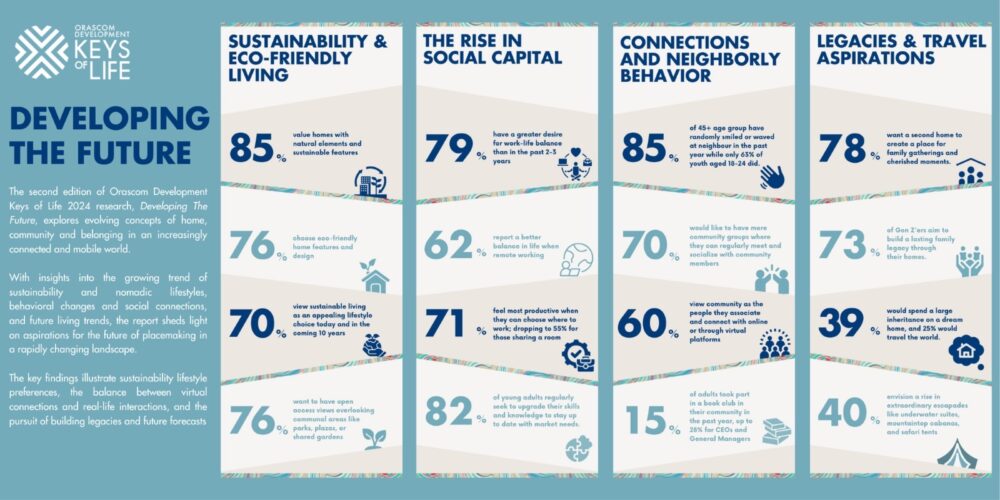Orascom Development, the leading international developer of vibrant, integrated communities in Europe, the Middle East, and North Africa, has unveiled the nextchapter of its Orascom Development Keys of Life 2024 initiativewith a new report called, Developing the Future. Tackling trends that are enabling resilient and adaptive communities. the second edition takes a deep exploration into the aspirations and desires shaping the way people live today and builds on the success of the inaugural edition, Redefining Community, (issued July 2024).
The Orascom Development Keys of Life initiative aims to understand and promote a dialogue around the fundamental ways in which the ever-changing global landscape of communities is shaping lives.
Summarizing the company’s flagship thought leadership initiative,Omar El Hamamsy, Group CEO of Orascom Development,said: “Redefining Community explored connection, wellness, and the sense of belonging that people seek in their communities. In Developing the Future, our latest report from Orascom Development Keys of Life 2024, we explore key lifestyle trends about how home, travel and social capital are evolving – and uncover what impact these changes will have on communities around the world. Additionally, we examine the crucial role of sustainability in creating living spaces that blend with nature. By taking a research-led approach to identifying these critical perspectives, we are confident the industry can design communitiesof tomorrow that meet the needs of how people want to live.”
A cornerstone of this initiative is the research conducted by global market research and data analytics firm, YouGov, surveying more than 3,600 people across the Middle East and North Africa (including UAE), Europe, the United Kingdom, and the United States to explore global trends affecting how people prefer to live.
Evolving the Home
El Hamamsy commented: “Communities and homes are evolving beyond just shelters, they are becoming sanctuaries where people can achieve a healthy balance between work, life, connections and well-being.”
There is a significant shift toward sustainable living. Reinforcing the importance of nature-centric communities as green spaces play a crucial role in promoting mental well-being. Seven out of 10 view sustainable living as an appealing lifestyle choice today and in the coming 10 years. 85% of respondents value homes that incorporate natural elements like greenery and water features and 76% prioritize sustainable features in eco-friendly homes with views overlooking communal areas like parks, plazas, or shared gardens.
Home is more than a physical location. It’s a feeling we carry with us wherever life may take us. Since the global pandemic, preference for a nomadic lifestyle is highest among youth aged 18-24 (78%).Meanwhile, many senior business leaders are combining travel, adventure, and remote work. In the past year, 33% of people travelled for bleisure, and it rose to 53% of CEOs. 81% feel traveling or exploring other areas outside of their own is important, which also rises to 88% for CEOs.
Raising Social Capital
El Hamamsy commented: “The value of social networks, trust and reciprocity, often referred to as ‘social capital’, has a profound impact on communities. Whether it is the atmosphere people work in, interacting with their neighbors or being part of community groups, all indicators show that communities should aim to foster social connections and encourage community activities.”
Evolving working habits require both functionality and aesthetic updates. 79% of Orascom Development Keys of Life respondents have a greater desire for work-life balance today than in the pasttwo to three years. While 71% of people feel most productive when they can choose where to work, only 55% of those sharing a room have this view. 73% agree that they get work done faster in a beautiful environment than an ugly one, with this rising to 89% for CEOs.
Community activities help create connections. Social interactions are lower in urban areas and among youth while loneliness is on the rise for these same groups. 85% of the 45+ age group randomly smiled or waved at a neighbor in the past year and only 17% agreethat they ‘feel lonely in the area where they live and worry about being isolated’; on the other hand, only 63% of young adults (age 18-24) smiled or waved, while 54% feel lonely. In urban areas, 46% randomly smiled or waved at a neighbor and 42% agree that they ‘feel lonely in the area where they live and worry about being isolated’; in more rural areas, 63% smiled or waved and only 21% feel lonely.
Public spaces grow in importance as community groups can provide a way to bring people together and create a sense of belonging, and CEOs and General Managers are leading the way. 70% of people expressed a desire for more community groups to regularly meet and socialize, suggesting the need for more spaces that bring people together and create a sense of belonging. 15% of adults took part in a book club in their community in the past year, that figure nearly doubled to 28% for CEOs and General Managers.
Imagining tomorrow
El Hamamsy commented: “When it comes to the communities of tomorrow, a sense of optimism can be found as nearly two-thirds of people anticipate that the area where they live will be better in 10years than it is today. For 35 years, Orascom Development has been focused on developing communities that withstand the test of time and allow people to enjoy “Life As It Should Be’ in our integrated and vibrant towns. We continue to challenge ourselves and our industry to develop the future by unlocking the ‘Keys of Life’.”
As travel trends evolve, the desire for experiences that combine wellness, sustainability, and luxury continues to grow. Orascom Development’s research found that 57% of people living in mansions anticipate a rise in personalized wellness programs and tech-powered travel, underscoring the importance of creating integrated communities that cater to both well-being and convenience.
When it comes to spending an unexpected financial windfall, such as an inheritance or lottery winnings, 39% of respondents said would purchase their dream home and 25% would travel the world.
When thinking about their dream home, 38% of people envisioned theirs to be located by a beach or sea – by far the number one ranking ahead of in a city center (18%) or in a rural area (13%).78% of respondents said they want a second home to gather family and loved ones, while 73% of Gen Z participants see second homes as an opportunity to build a lasting family legacy.
For more details about Orascom Development Keys of Life, visit kol.orascomdevelopment.com
For media enquiries please contact:




























